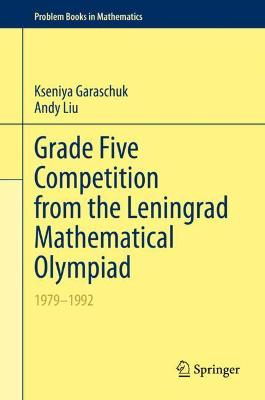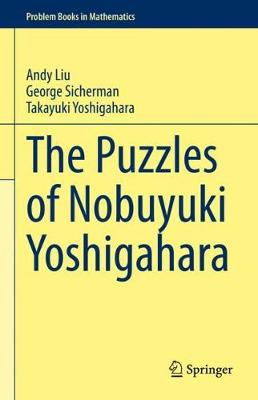Problem Books in Mathematics
2 total works
Grade Five Competition from the Leningrad Mathematical Olympiad
by Kseniya Garaschuk and Andy Liu
Published 1 August 2020
This unique book presents mathematical competition problems primarily aimed at upper elementary school students, but are challenging for students at any age. These problems are drawn from the complete papers of the legendary Leningrad Mathematical Olympiads that were presented to the city's Grade Five students. The period covered is between 1979 - the earliest year for which relevant records could be retrieved - and 1992, when the former Soviet Union was dissolved.
This book can be used by any mathematically advanced student at the upper elementary school level. Teachers and organizers of outreach activities such as mathematical circles will also find this book useful. But the primary value of the book lies in the problems themselves, which were crafted by experts; therefore, anyone interested in problem solving will find this book a welcome addition to their library.
The Puzzles of Nobuyuki Yoshigahara
by Andy Liu, George Sicherman, and Takayuki Yoshigahara
Published 23 December 2020
This book convenes a selection of 200 mathematical puzzles with original solutions, all celebrating the inquisitive and inspiring spirit of Nobuyuki "Nob" Yoshigahara - a legend in the worldwide community of mathematical and mechanical puzzles. A graduate from the Tokyo Institute of Technology, Yoshigahara invented numerous mechanical puzzles and published over 80 puzzle books. In 2003, he was honored with the Sam Loyd Award, given by the Association for Games & Puzzles International to individuals who have been made a significant contribution to the world of mechanical puzzles.
In this work, the reader will find some of the most ingenious puzzles ever created, organized in ten categories: Logic, matchstick, maze, algorithmic, combinatorial, digital, number, geometric, dissection, and others. Some of them could rivalry with those found at Mathematical Olympiads tests around the globe; others will work as powerful brain teasers for those with an interest in problem-solving. Math teachers, curious students of any age and even experienced mathematicians with a taste for the fun in science can find in this book unconventional paths to develop their problem-solving skills in a creative way.
In this work, the reader will find some of the most ingenious puzzles ever created, organized in ten categories: Logic, matchstick, maze, algorithmic, combinatorial, digital, number, geometric, dissection, and others. Some of them could rivalry with those found at Mathematical Olympiads tests around the globe; others will work as powerful brain teasers for those with an interest in problem-solving. Math teachers, curious students of any age and even experienced mathematicians with a taste for the fun in science can find in this book unconventional paths to develop their problem-solving skills in a creative way.

